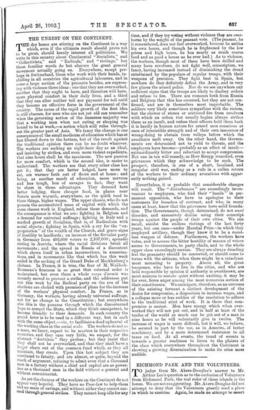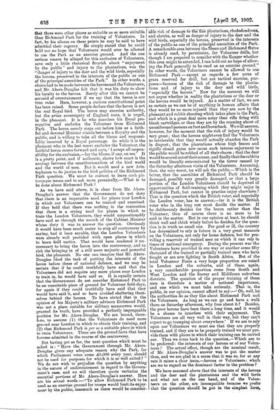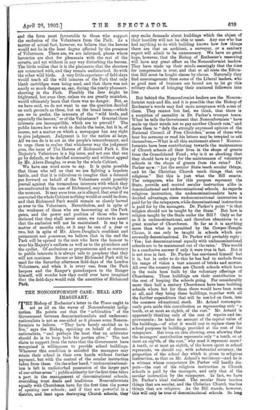RICHMOND PARK AND THE VOLUNTEERS.
T° judge from Mr. Akers-Douglas's answer to Mr. Arthur Lee's question as to the exclusion of Volunteers from Richmond Park, the real ruler of these islands is the heron. We are not exaggerating. Mr. Akers-Douglas did not attempt to deny that the Volunteers greatly need a place in which to exercise. Again, he made no attempt to assert that there were other places as suitable as er more suitable than'Richmond Park for the training of Volunteers. In fact, by his silence on these points he may be said to have admitted their cogency. He simply stated that he could hold Out no hope that Volunteers would ever be allowed to use the Park as an exercise ground. And the one serious reason he alleged for this exclusion of Volunteers, save only a little rhetorical flourish about "enjoyment by the public" and injury to the plantations, was the "danger of injury to the deer and the wild birds, especially the herons, preserved in the interests of the public as one of the principal amenities of the Park." In other words, a choice had to be made between the herons and the Volunteers, and Mr. Akers-Douglas felt that it was his duty to show his loyalty to the herons. Surely after this we cannot be accused of overstatement if we say that the heron is our true ruler. Here, however, a curious constitutional point has been raised. Some people declare that the heron is not the real Royal bird. The heron may exercise authority, but the avian sovereignty of England rests, it is urged, in the pheasant. It is he who exercises his Royal pre- rogative and excludes the Volunteer from Richmond Park. The heron merely steps out before him as a faith- ful and devoted Minister stands between a Royalty and the public, and is willing to take all the blame and responsi- lillity incurred by a Royal personage. So while it is the pheasant who in the last resort excludes the Volunteer, the faithful heron comes forward and says, I accept all respon- sibility for the exclusion,—lay the blame, if any, on me.' It is a pretty point, and if authentic, shows how exact is the analogy between the constitutionalism of the bird world and the world of men. But it would need a new Aris- tophanes to do justice to the bird politics of the Richmond Park question. We must be content to leave such pic- turesque issues and to ask more prosaically,—What is to be done about Richmond Park ?
• As we have said above, it is clear from Mr. Akers- Douglas's answer that the Government do not deny that there is an imperative need for places near London in which our Volunteers can be trained and exercised. If they held that there was nothing in the contention that there is a crying need for places in which to train the London Volunteers, they would unquestionably have said so through the mouth of the Cabinet Minister whose duty it was to answer the question. Obviously it would have been much easier to stop all controversy by saying, had it been sayable, that the London Volunteers were already well provided with open places in which to learn field tactics, That would have rendered it un- necessary to bring the heron into the controversy, and to risk the bringing in of• a still more majestic and powerful bird, the pheasant,. No one can imagine that Mr. Akers- Douglas liked the task of putting the interests of the heron before those of national defence, and we may be certain that if he could truthfully have said that the Volunteers did not require any more places near London to train in, he would have said so. It is equally certain that the Government do not consider Richmond Park to be an unsuitable piece of ground for Volunteer field-days, for again if they could truthfully have said that they would have said it, and so have avoided sheltering them- selves behind the herons. • To have stated that in the opinion of his Majesty's military advisers Richmond Park was not a place suitable for military manceuvres would, granted its truth, have provided a perfectly impregnable position for Mr. Akers-Douglas. We are bound, there- fore, to assume (1) that the Volunteers do need more ground near London in which to obtain their training, and (2) that Richmond Park is per se a suitable place in which to train Volunteers. These are the ground facts that have become admitted in the course of the controversy.
But having got so far, the next question which must be asked is : "Have the Government through Mr. Akers- Donglas given 'any adequate reason why the Park, for which Parliament votes some .t5,000 every year, should not be used for purposes for which it is so well suited ? " We do not wish to prejudice the question by anything in the nature of understatement in regard to the Govern- meal case, and we will therefore quote verbatim the essential portions of Mr. Akers-Douglas's answer. Here are his actual words :--" To allow Richmond Park to be used as an exercise ground for trootreri:ould limit its enjoy- ment by the public, inasmuch as would be consider- le risk of damage to the—fiiii plantations, rhododendroni, and shrubs, as well as dangerot injury to the deer and the wild birds, especially the herons, preserved in the interests of the public as one of the principal amenities of the Park. A considerable area between the Sheen and Richmond flees is already used, by permission, for Volunteer drills, but though I am prepared to consider with the Ranger whether this area might be extended, I can hold out no hope of allow- ing the Park generally to be used as an exercise ground." In other words, the Volunteers cannot be allowed to use Richmond Park — except as regards a few acres of grass reserved for drill, but not tactical exercise, pur- poses—because of the risk of damage to the planta- tions and of injury to the deer and wild birds, "especially the herons." Now for the moment we will not argue whether in reality the plantations or the deer or the herons would be injured. As a matter of fact, we are as certain as we can be of anything in human affairs that they would be no more injured than they are now by the pheasant and rabbit shooting which takes place in the Park, and which is a great deal more noisy than rifle firing with blank cartridges, or than they are by the roaming about of unnniformed persons on foot and horseback. We will assume, however, for the moment that the risk of injury would lie very great ; that the herons might even find the Volunteers so intolerable that they would actually abandon the Park in disgust ; that the plantations whose high fences and rigidly closed gates now cause such intense enjoyment to the public would be robbed of all their charm that the deer would be scared out of their senses ; and finally tat the rabbits would be literally exterminated by the terror caused by the Saturday afternoon visits of the Volunteers. Assuming, then, the very worst, we will ask the public,—Which is the better, that the amenities of Richmond Park should be damaged, possibly very greatly damaged, or that a large portion of the London Volunteers should be deprived of opportunities of field-training which they might enjoy in i Richmond Park, but cannot n practice enjoy elsewhere ? That is the question which the British voter, and especially the London voter, has to answer,—for it is the British voter who in the long run must decide the matter. If he deliberately decides for the heron rather than the Volunteer, then of course there is no more to be said in the matter. But in our opinion at least, he should think well and think wisely before he decides, for the ques- tion is in truth no small one. For good or ill, the country has determined to rely in future in a very great measure on the Volunteers, not only for home defence, but for pro- viding a reservoir of trained men on which it can rely In times of national emergency. During the present war the Volunteers have provided in one way or another some fifty thousand of the trained or partially trained men who have fought or are now fighting in South Africa. But of the total Volunteer Force a very large proportion are raised in London and the suburbs, and of these, again, a very considerable proportion come from South and West London and the Surrey and Middlesex suburban districts. The question of the proper training of these men is therefore a matter of national importance, and one which we must take seriously. That is, the public, in our opinion, cannot afford to say:—' Oh, well, let the authorities do as they like about Richmond Park and the Volunteers. As long as we can go and have a walk there on Saturday afternoon, why fuss about it? Besides, the poor herons have been there a long time, and it would be a shame to interfere with their enjoyment. The Volunteers are all very well in their way, but they can't expect to go tramping about everywhere.' If we are to rely upon our Volunteers we must see that they are properly trained, and if they are to be properly trained we must pro- vide them with places in which their training can be carried out. Thus we come back to the question,—Which are to be preferred: the interests of our herons or of our Volun- teers? The actual effect, though not the nominal result, of Mr. Akers-Douglas's answer was to put the matter thus, and we are glad in a sense that it was so, for at any rate it raises a clear issue,—herons or Volunteers : which are we to regard as the dominant factor in the problem ?
We have assumed above that the interests of the herons and the deer and the plantations and the wild birds and what not on the one hand, and of the Volun- teers on the other, are incompatible because we prefer that the question should be put in the simplest form, and the form most favourable to those who support the exclusion of the Volunteers from the Park. As a matter of actual fact, however, we believe that the herons would not be in the least degree affected by the presence of Volunteers. There are, we are informed, places where heronries are shot for pheasants with the rest of the onverts, and i yet without n any way disturbing the herons. The birds realise that it is the pheasants that the shooters are concerned with, and they remain undisturbed. So with the other wild birds. A very little experience of field-days would teach all the wild inmates of the Park that only blank cartridges were being used, and that there was not nearly so much danger as, say, during the yearly pheasant- sheoting in the Park. Possibly the deer might be frightened, but even they, unless we are greatly mistaken, would ultimately learn that there was no danger. But, as we have said, we do not want to see the question decided on such grounds as these, but on the broad issue,—which are we to prefer, the interests of the "wild birds, and especially the herons," or of the Volunteers? Granted these interests are incompatible, which are to prevail ? The public knows how we wish to decide the issue, but it is, of course, not a matter on which a newspaper has any right to give judgment. Judgment is for the nation at large. All we can do is to act as the people's remembrancer, and to urge them to realise that whichever way the judgment goes, the issue of The Herons of Richmond Park v. His Majesty's Volunteers is a big issue, and not one that can go by default, or be decided summarily and without appeal by Mr. Akers-Douglas, or even by the whole Cabinet. We have one word more to say. It is quite possible that those who tell us that we are fighting a hopeless battle, and that it is ridiculous to imagine that a demand 'kit forward on behalf of the Volunteers could possibly prevail against the tremendous interests with which they are confronted in the case of Richmond, may prove right for the moment. It may seem true, as is alleged, that even if we converted the whole Cabinet nothing would or could be done, and that Richmond Park would remain as closely barred as ever to the Volunteers. Nevertheless, and in spite of the weakness of those who are hammering at the Park gates, and the power and position of those who have declared that they shall never enter, we venture to assert that the ermine:ion will not be maintained. It may be a matter of months only, or it may be one of a year or two, but in spite of Mr. Akers-Douglas's confident and permanent non possumus, we believe that in the end the Park will be opened to the men who have the honour to wear his Majesty's uniform as well as to the picnickers and the cyclist. Of exclusions so preposterous and so contrary to public interests it is always safe to prophesy that they will not continue. Sooner or later Richmond Park will be used for the Saturday afternoon field-days of the London Volunteers, and when it is every one, from the Park keepers and the Ranger's gamekeepers to the Ranger himself, will wonder bow they could ever have imagined that the field-days would ruin the amenities of Richmond Park.




























































 Previous page
Previous page